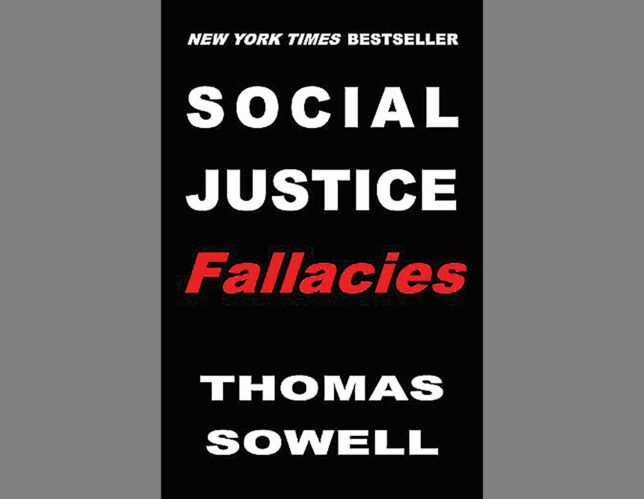Organization Trends
Thomas Sowell on Social Justice Fallacies: “Equal Chances” Fallacy
 Social Justice Fallacies cuts through the muddled and misleading thinking that is creating so much havoc in America. Credit: Amazon. License: https://shorturl.at/rzGNO.
Social Justice Fallacies cuts through the muddled and misleading thinking that is creating so much havoc in America. Credit: Amazon. License: https://shorturl.at/rzGNO.

Thomas Sowell on Social Justice Fallacies (full series)
“Equal Chances” Fallacy | Racial Fallacies
Knowledge Fallacies | Affirmative Action
Summary: “Social justice” has become all the rage in academia, the mainstream media, and corporate boardrooms across America, spurred on by the violent Black Lives Matter movement and pseudo-thinkers like Robin DiAngelo and Ibram X. Kendi. In his new book Social Justice Fallacies, Thomas Sowell cuts through the muddled and misleading thinking that is creating so much havoc in America.
Thomas Sowell’s influence is unparalleled among current intellectuals. Entering his name into an internet search engine yields millions of results, while a search of YouTube finds a near endless number of videos to choose from.
Sowell has achieved this influence through dozens of books and thousands of articles that cut through modern cant with common sense conveyed in plain, easy-to-understand language. His legacy would be secure even if he had stopped writing years ago.
But, at age 93, Sowell has written a new book entitled Social Justice Fallacies. The book couldn’t have come at a better time. Spurred on by the violent Black Lives Matter movement and pseudo-thinkers like Robin DiAngelo and Ibrim X. Kendi (née Ibram Henry Rogers), “social justice” has become all the rage in academia, the mainstream media, and corporate boardrooms across America.
Sowell once quipped that since justice involves the relationship between two or more people, what kind of justice isn’t social? Indeed, the term is soothing rhetoric that hides an agenda based on fallacious beliefs. Social Justice Fallacies cuts through the muddled and misleading thinking that is creating so much havoc in America.
Sowell recently sat down with David Hogberg, a former senior research associate at the Capital Research Center, for an interview about his new book.
Hogberg: You are in your 90s and you should be enjoying retirement. So, why did you write this book?
Sowell: Well, there were things that needed to be said, and other people who weren’t saying the, and perhaps they had enough sense not to say them.
“Equal Chances” Fallacy
Hogberg: In chapter one you look at what you call the “equal chances” fallacy. Explain what that is.
Sowell: Well, it’s the idea that if you find groups, whether by race, by sex, or whatever, all who are doing very differently in terms of outcomes or the skills that lead to those outcomes, we wonder why there are these disparities. The tendency is to look for someone to blame for this. It seems to me that when you think about it, realistically, there’s very little reason to expect different people to have similar outcomes or skills—or that everyone even wants to have the same skills much less put in the effort to get those skills.
For example, one of the ways in which groups differ is age. People give very little attention to that. There are American ethnic groups where the average age differs by a decade, some that differ by more than two decades. I would suggest to people who are in their 40s or 50s that they look back when they were in their 20s and compare the salary they had when they were in their 20s to the ones they have in their 40s or 50s. If they did that many of them would discover that the disparity is greater than the disparity between the sexes or the disparity between the races.
Hogberg: A big theme of chapter one is that even if a society obliterated every last ounce of discrimination and everyone was given an equal chance at success, different groups in that society would still not have equal outcomes.
Sowell: Yes. Different groups have different cultures, and thus they have different values. One of my pet examples is, if there’s some black kid in Harlem who grew up with the exact same muscular makeup in his body as the famous ballet dancer Rudolph Nureyev, the odds that he would become a ballet dancer are something like 100 to one if not 1,000 to one. Why? Because he’ll probably never even think about becoming a ballet dancer given where he lives.
Hogberg: You don’t mention this concept in chapter one, but I think it is related to your discussion of human capital, and that is this trendy new term “cultural appropriation.” It’s the name now given to the practice of one culture taking and using an idea developed by a different culture, and that is immoral because it amounts to stealing. The people making this argument about cultural appropriation, should we take them seriously?
Sowell: No. The entire human race does that. For example, in ancient civilization, the Greeks were way ahead of the British. The Greeks were much closer geographically to the civilizations in Northern African and the Middle East. The Greeks had far more chances to learn from those civilizations than the British did, who were located thousands of miles away. So Greek civilization takes off and is literally centuries ahead of the British, just due to accidental location.

The lady in charge of the Success Academy Charter School, she’s Jewish. It also happens that her father was a mathematician at Stuyvesant High School, which is big on mathematics and science. Shortly after she took over, the fifth-grade class at that school—kids from Harlem—did better on the math exams than any fifth-grade class anywhere in the entire state of New York. Credit: sa_harlem1. License: https://bit.ly/3NzAUXi.
Hogberg: Where would the human race be if we didn’t engage in this kind of behavior?
Sowell: We would still be back in the caves. No given group has been able to progress just on its own terms. Three years ago, I wrote a book about charter schools. The lady in charge of the Success Academy Charter School, she’s Jewish. It also happens that her father was a mathematician at Stuyvesant High School, which is big on mathematics and science. So she had all these things that these kids in Harlem don’t have. Shortly after she took over, the fifth-grade class at that school—kids from Harlem—did better on the math exams than any fifth-grade class anywhere in the entire state of New York. They appropriated her knowledge, to use those kinds of terms.
Virtually everything we lay our eyes and ears on has been appropriated. The numbers that we use originated in India. The letters that we use originated with the Romans, and so on. Everyone wants to take advantage of the knowledge that other people have. I don’t want to be operated on by a surgeon who is as clumsy as I am.
In the next installment, Sowell notes parallels between progressives of the early 20th century and the progressives of today.



